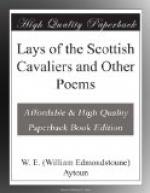Wherefore, Love, didst thou betray
me?
Where is now the tender glance?
Where the meaning looks once lavished
By the dark-eyed Maid of France?—p.
168.
There appears to be no doubt that Prince Charles was deeply attached to one of the princesses of the royal family of France. In the interesting collection called “Jacobite Memoirs,” compiled by Mr. Chambers from the voluminous MSS. of Bishop Forbes, we find the following passage from the narrative of Donald Macleod, who acted as a guide to the wanderer whilst traversing the Hebrides:—“When Donald was asked, if ever the Prince used to give any particular toast, when they were taking a cup of cold water, or the like; he said that the Prince very often drank to the Black Eye—by which, said Donald, he meant the second daughter of France, and I never heard him name any particular health but that alone. When he spoke of that lady—which he did frequently—he appeared to be more than ordinarily well pleased.”
THE OLD SCOTTISH CAVALIER
The “gentle Locheill” may he considered as the pattern of a Highland Chief. Others who headed the insurrection may have been actuated by motives of personal ambition, and by a desire for aggrandisement; but no such charge can be made against the generous and devoted Cameron. He was, as we have already seen, the first who attempted to dissuade the Prince from embarking in an enterprise which he conscientiously believed to be desperate; but, having failed in doing so, he nobly stood firm to the cause which his conscience vindicated as just, and cheerfully imperilled his life, and sacrificed his fortune, at the bidding of his master. There was no one, even among those who espoused the other side, in Scotland, who did not commiserate the misfortunes of this truly excellent man, whose humanity was not less conspicuous than his valour throughout the civil war, and who died in exile of a broken heart.
Perhaps the best type of the Lowland Cavalier of that period, may be found in the person of Alexander Forbes, Lord Pitsligo, a nobleman whose conscientious views impelled him to take a different side from that adopted by the greater part of his house and name. Lord Forbes, the head of this very ancient and honourable family, was one of the first Scottish noblemen who declared for King William. Lord Pitsligo, on the contrary, having been educated abroad, and early introduced to the circle at Saint Germains, conceived a deep personal attachment to the members of the exiled line. He was anything but an enthusiast, as his philosophical and religious writings, well worthy of a perusal, will show. He was the intimate friend of Fenelon, and throughout his whole life was remarkable rather for his piety and virtue, than for keenness in political dispute.




